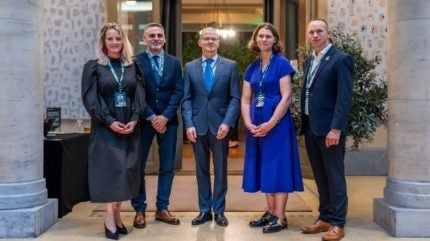
The WRAP EU talks brought together European Commission officials, executives from the textile and fashion industry, representatives from non-profit organisations, trusts, foundations, and additional stakeholders.
The agenda for the event was to explore strategies for the EU to transition from the traditional linear model of consumption, characterised by the pattern of take, make, and dispose, to a Circular Living approach that emphasises reuse, repair, and remanufacturing.

Discover B2B Marketing That Performs
Combine business intelligence and editorial excellence to reach engaged professionals across 36 leading media platforms.
Textiles, and other manufactured goods are collectively responsible for approximately 45% of global greenhouse gas emissions, making the change relevant in these sectors.
The special meeting was convened following the postponement in the final vote on the revised Waste Framework Directive. Due to this delay, member states have started accumulating large quantities of used textiles in compliance with requirements effective from January 2025, said WRAP.
However, they are doing so without adequate infrastructure to process these materials and with a lack of comprehensive national textile Extended Producer Responsibility (EPR) schemes to facilitate development or growth.
WRAP, which focuses on EPR development across the textiles and fashion sector, presented its analysis on varying EPR policies across Europe concerning plastics and its collaboration with the Irish Government to establish a textile EPR scheme in anticipation of the Directive.

US Tariffs are shifting - will you react or anticipate?
Don’t let policy changes catch you off guard. Stay proactive with real-time data and expert analysis.
By GlobalDataThe summit featured keynotes and discussions led by Catherine David and David Rogers, director of international development at WRAP.
Notable speakers included Klaus Berend from DG SANTE at the European Commission, Laura Lourdelle from Sodexo, Paul Kerssens from United Repair Centre, and Stéphane Leroux from IFWC.
Catherine David was introduced as the new CEO of WRAP during the meeting, along with Sofie Schop as executive director of WRAP EU.
Catherine David assumed the role effective 1 June 2025 to propel the charity’s sustainability initiatives globally.
“The incoming textiles EPR will touch every member from Copenhagen to Milan and change how countries make and manage clothes for good. Its Waste Framework Directive is world-leading in ambition for transformative collaborative action, underscored by its long track record of sustainable leadership. Driving Circular Living models on this scale will have a profound impact on global actions to cut greenhouse gas emissions. I am delighted to convene this meeting to show how this should be a blueprint for more action from more countries, more businesses and more governments to secure a prosperous and sustainable future for us all,” said David.
Sofie Schop has over two decades of experience in ESG and circular economy principles and having held significant roles at various organisations including Versuni, PVH, Tommy Hilfiger, Karl Lagerfeld, G-STAR RAW, Cascale, Schuttelaar & Partners and Fair Wear Foundation.
Under this new role, Schop will lead WRAP EU’s efforts to integrate sustainability practices into business operations throughout Europe.





